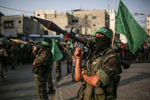Senior officers ask, "Where did the recordings of October 7, which were to be used for the next day's investigation, end up?"
Amir Bohbot
3.12.2023 / 13:38
During a visit by senior officials it became clear that recordings from cameras along the border from the day the war broke out disappeared as if nothing had happened. Important recordings of Black Sabbath were also downloaded from the database.
"It arouses suspicion, it gives the feeling that everyone is looking out for the day after." IDF:
"The videos were not deleted, but blocked for people without permission."
With the possibility of a ground maneuver south of the Gaza Strip, task forces were set up last week to analyze the lessons of the war and Hamas' methods of operation, to be distributed to the brigades' combat teams. At the same time, research teams were set up for the "day after", which were to help shape the border area and the security strip being built to protect the settlements.
Be careful to delete the videos from the various IDF surveillance cameras along the Gaza Strip border, from the military
network known as "Zi Tube", from the day the war against Hamas broke out, on October 7, to prevent them from an in-depth investigation of what happened in the Palestinian territory, the infiltration of the border line and the area.
"We sat down with one of the generals and were going to show him a video about one of the events, and we found out that someone had deleted the videos," said a senior reserve officer from one of the divisions, adding,
"It was very embarrassing. Then suspicion arose as to why someone would do that. And at the end the excuses started that it was decided to give special privileges to certain officers to view the footage. Do officers in our ranks need privileges? It looks like a war between generals and officials. There is a feeling that everyone is now trying to take care of themselves for the day after,"of the Oct. 7 contact recordings.
According to them, "
Some of the recordings have disappeared or were simply downloaded from the network and transferred to another location at the direction of commanders. We are unable to hear them … Someone decided to transfer or delete them so that no one will hear them. The recordings tell the whole story of what happened, what we did, especially in the first 8 hours and in the moments when there was really no one to talk to
Response from IDF spokesman: No videos were removed from the operating systems after the events of October 7. The videos are blocked for people without permission, to prevent them from being viewed out of curiosity and voyeurism. In addition, all videos are retained for the benefit of the in-depth investigation to be conducted on the subject by the relevant parties.
A qualified military officer and official said,
"In the system in question, the videos are automatically deleted after a few days. If necessary, the videos are saved in a separate folder. In this case, all videos were saved."
Translated with www.DeepL.com/Translator

 southfront.press
southfront.press





